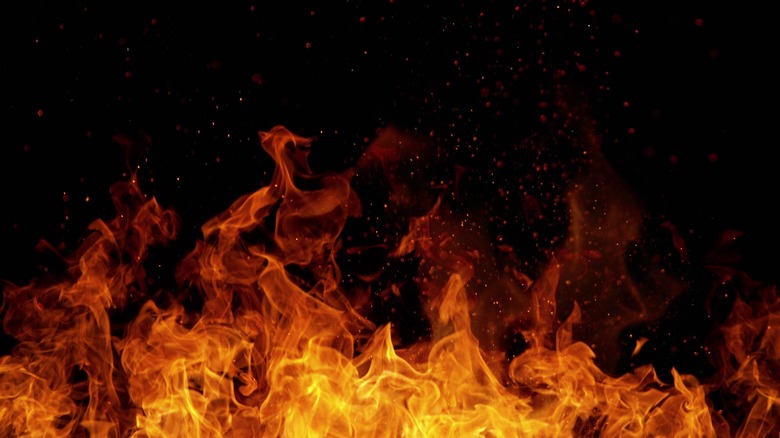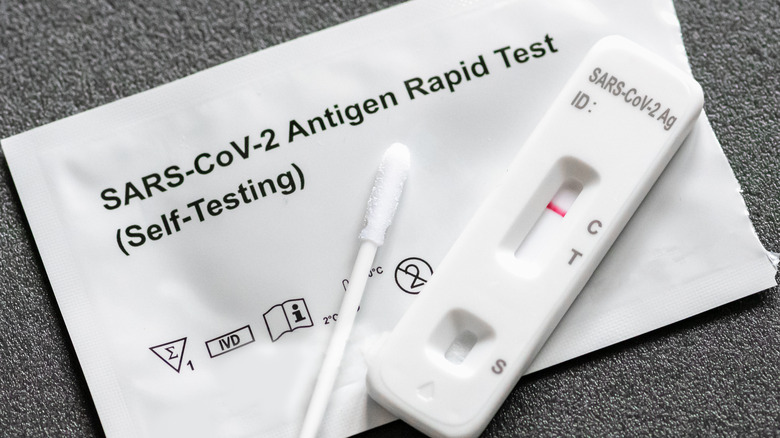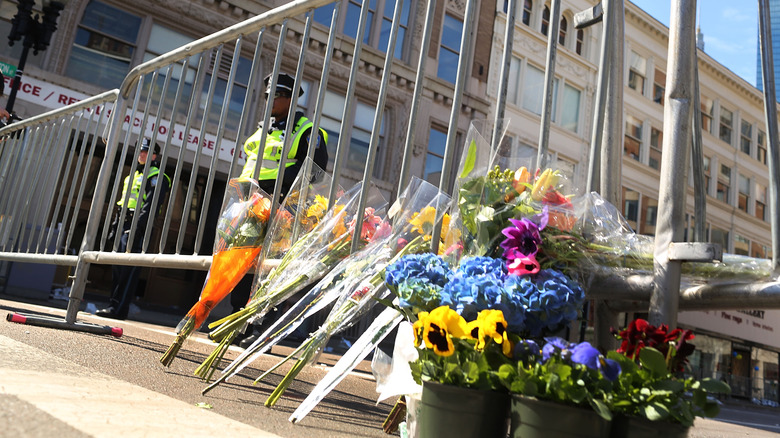How Accurate Is The Pass By Catastrophe Exam Urban Legend?
College is one of those experiences, like parenting or marriage, that many (but certainly not all) of us will go through. For the American version of the experience, for most of us, it's four years of almost-unchecked freedom, for good or for ill, plus a time when we experience new relationships, form lifelong friendships, and maybe, just maybe, learn a thing or two.
Another part of the college experience is the urban legend. Every college or university in this country doubtless comes with its own lore — the freshman who returned to her dorm to find her roommate murdered, for example. Or perhaps a particular dormitory building is haunted, or maybe there's something of great mystery or great value hidden behind or within some mundane door or object.
In fact, there's a college urban legend that's adjacent to being real. The phenomenon is called "passing by catastrophe," and the legend states that if a catastrophe befalls you or your university in some way, you get some benefit. In fact, these urban legends are mostly just that — legends (we'll explain why later). But in a few specific cases, a few schools have made some meaningful accommodations to students when a catastrophe has stricken them.
Passing By Catastrophe
Like almost all urban legends, the "passing by catastrophe" legend and benefit varies depending upon the teller. Basically, create one wheel with any number of tragedies — mass violence, a traumatizing death, natural disaster — and create another with any number of supposed outcomes — free room and board, automatically passing all classes, etc. — and you've got your own college urban legend generator.
And then there are the meta legends. Like the one that the Stanford Daily describes, saying if an earthquake occurs during a final exam, everyone passes. Or as Salarship says, if the university burns down, everyone automatically gets a free degree.
Of course, it's impossible to prove a negative, and short of carefully reading the policies of every last one of the 4,360 degree-granting institutions in the U.S., there's no saying that every last such urban legend is untrue. Salarship does a pretty good job of providing evidence that "passing by catastrophe" and its related variations are myths. But on a few occasions, universities have extended some leeway to their students in the wake of a catastrophe.
Example 1: COVID-19
Back when the COVID-19 pandemic first started hitting in the early days of 2020, the world was effectively on its own in figuring out how to deal with it, and across the world, decisions were being made on a case-by-case basis, regardless of what was being done one country, one state, or even one town away. This was particularly true in education: some schools went to fully-online instruction, some stayed open, some went to a hybrid model. Others simply canceled all together, as Research on Education Access and Choice reports.
In terms of higher education, the response was equally haphazard. As The New York Times reports, at least some colleges and universities temporarily did away with letter grades and made all classes simply "pass/fail." In a special case out of Sri Lanka, noted by Salarship, university students were uniformly passed on their exams, but they were only given "C" grades or simply "Pass" grades.
Example 2: The Boston Marathon Bombing
On April 15, 2013, terrorists detonated two bombs at the finish line of the Boston Marathon, killing three people and injuring 180, injuries that in a few cases resulted in the loss of limbs. The attack was an unimaginable tragedy for the city, as well as for its tens of thousands of students attending classes in any of the city's multiple colleges and universities. As Salarship reports, for most of those students, classes were winding down when the attack took place, and final exams were scheduled or were taking place.
Schools all over Boston canceled their final exams in the wake of the bombing. However, the event didn't result in automatic A's for everyone. In fact, a few students — those who were counting on a good performance on their final exam for an improvement in their overall grades — might have been worse off after their exams were canceled. That's because schools canceled exams and just calculated the students' grades on their work before the final exams. Those who would have passed regardless passed. Those who were failing ahead of the exam got an F in the class. That was it.
Individual Leeway And Accomodations
As you've gleaned from the previous examples, when universities do cancel exams or automatically pass everybody or do something adjacent, it's done in response to a wide-ranging catastrophe that affects multiple students, such as a terrorist attack or a worldwide pandemic. But what about when someone suffers an individual tragedy, such as the death of a roommate (which is one of the foundational iterations of the "pass by catastrophe" myth)?
As mentioned above, not only does the myth vary by the teller, but the response to how a university handles, say, the death of a student's roommate, is also going to vary. As ThoughCo reports, students at college and universities are adults and, as such, their schools are going to treat them as adults, and that means dealing with tragedy in an adult way. Some schools may make special accommodations for a student who experienced such a tragedy, such as by giving extensions on deadlines or perhaps allowing them to change residences. But automatic A's in all classes? Forget about it. As ThoughtCo explains, it wouldn't be fair. This type of treatment would harm the schools' academic reputations. However, there are resources and counselors in higher education who can help students navigate in the aftermath of tragedies.




